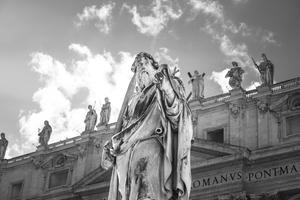‘Fiducia Supplicans’: Unequivocal Leadership Needed to Manage Fallout
EDITORIAL: The continuing confusion over the Vatican’s Dec. 18 document is recent evidence of this phenomenon.

The Catholic Church on March 7 marks the 750th anniversary of the death of one of its greatest thinkers and teachers, St. Thomas Aquinas.
One of Aquinas’ titles is the “Common Doctor,” so chosen because of his extraordinary gift for articulating and defending the common truths of our Catholic faith. This unity of faith is what binds together Catholics all over the world. In other words, the faith proclaimed in Ulaanbaatar, Mongolia, is, or should be, the same as it is in the United States.
But that crucial unity is threatened by the confusion caused in many quarters since the Dec. 18 release of Fiducia Supplicans. The controversial declaration, written by Dicastery for the Doctrine of the Faith’s prefect Cardinal Víctor Manuel Fernández and approved by Pope Francis, sets parameters for “non-liturgical” blessings of couples in “irregular” relationships. These include same-sex couples, civilly-divorced-and-remarried heterosexual couples, and couples who are unmarried and co-habitating.
The reception to Fiducia Supplicans has been anything but uniform. While some cardinals and bishops in the West have welcomed it, Church leaders in much of Africa and other parts of the world have flatly rejected it. What that means is that these blessings are happening in some places but not in others.
Why is that a problem? Because we’re a universal Church, to begin with. We’re also living in the internet age, so while the blessing of a same-sex couple in Belgium may not confuse or distress many Belgian Catholics, it can scandalize the faithful in Ghana or Mexico once they learn of it.
That’s already happening. Just in the past week, we’ve seen scandals erupt in Spain, where two Catholic men held what appeared to be a well-attended wedding in a private Catholic chapel, and in Uruguay, where the local bishop and even the country’s apostolic nuncio approved the blessing of a high-profile same-sex couple that received extensive media coverage, even though the Vatican’s document says these blessings are supposed to be simple and “spontaneous.”
Now, a Vatican editorial is further muddying the Fiducia waters.
Written by Andrea Tornielli, editorial director of the Dicastery for Communication, the editorial tries to make the case that a document on prayers for the sick that then-Cardinal Joseph Ratzinger issued in 2000 during John Paul II’s pontificate established a precedent for distinguishing between liturgical and non-liturgical blessings. That distinction lies at the core of Fiducia Supplicans.
However, it’s difficult to see how the two documents are related. Cardinal Ratzinger’s “Instruction on Prayers for Healing” does refer to “liturgical” and “non-liturgical” prayer, but its focus is on regulating prayer meetings for those seeking physical or spiritual healing. It came in response to the growing frequency with which these meetings were taking place outside of churches and beyond the supervision of ecclesiastical authorities. And if it’s true that it does somehow lend support to Fiducia, as Tornielli argues, why isn’t it cited anywhere in that document?
A charitable reading of the Vatican editorial would see it as a sincere attempt at finding a way to harmonize Pope Francis’ initiative in Fiducia Supplicans with the works of his predecessors, not a thinly veiled attempt to deflect criticism of Fiducia by throwing Benedict XVI and John Paul II under the bus.
Whatever the case may be, the Archdiocese of Madrid demonstrated a far better way to respond to the confusion surrounding Fiducia.
Following news reports about a wedding-like ceremony involving two men (but reportedly not a priest) in a private chapel in the town of El Escorial outside Madrid, the archdiocese issued a strongly worded statement, saying the family-owned chapel will be subject to “canonical effects” and de-consecration. The archdiocese, incidentally, is led by Cardinal José Cobo Cano, who received his red hat from Pope Francis last September and who has been outspoken in his support of Fiducia since its release.
Our Church needs that kind of clear, unequivocal approach to the predicament we now face. Nothing less can maintain the unity of faith that St. Thomas Aquinas dedicated his life and massive intellect to safeguarding.
- Keywords:
- Fiducia Supplicans
- same-sex blessings
















